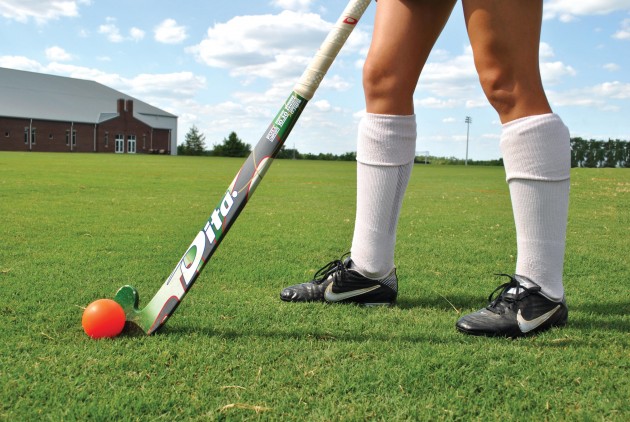
For the second straight year, the field hockey team is displaced from its home field and forced to play on another due to a virus that rendered the field unplayable.
Fortunately, a viable option was available, one that may prove to be the answer to the problem which has plagued university groundskeepers for the past two years.
The team is now training on the football practice field between the Indoor Track and Tennis Center and Blackstock Stadium. Growing on the field is a new type of grass that was planted at the end of June by head groundskeeper Rob Harper and his staff — Bermuda grass.
"We took a chance with Bermuda grass," Harper said. "Bermuda grass is a warm season grass typically grown south of the Ohio River. It loves heat and no rain."
The grass, according to Harper, might be a better alternative to the bluegrass and rye grass which are on DePauw's field hockey field. Those grasses have biological issues making them problematic on a field hockey field in Indiana.
"For bluegrass and rye grass, the ideal height is two to four inches," Harper said. "For field hockey, we try and maintain it at an inch and a half to an inch and a quarter. That adds more stress to the grass. It's not biologically ideal for it."
After another dry, hot and humid summer, the grass, with stress being compounded on it, contracted a virus.
"We had another tough summer just like we did last year," Harper said. "We fight disease on all of them. It just so happens that this field is more susceptible than others."
Last fall, Harper and his staff encountered a similar problem with the grass due to the hot and dry summer. The field hockey team was forced onto the soccer field, where they split the field and time with the women's soccer team. Following last year's issues, Harper spoke with representatives from universities in the area to find out which grasses work for them.
He found that Rose-Hulman Institute of Technology uses Bermuda grass, as do Purdue University and Indiana University. He decided to take a chance with the football practice field. All accounts thus far have concluded that the Bermuda grass is living up to expectations.
"It can handle a low cut," Harper said. "The downside is when it gets colder, it will go dormant sooner. But it will still perform essentially as a carpet."
At first frost, Harper said, it will go dormant. But in the future, if plans to use Bermuda grass are embraced, rye grass and bluegrass will be seeded with the Bermuda grass to maintain the field's color when the Bermuda grass goes dormant.
In the meantime, the field hockey team is enjoying its time on the new Bermuda grass.
"Bermuda grass is a better surface for field hockey because it's smoother and the pace of the ball is a lot faster," said field hockey head coach Gina Preston. "Our transition when we go to play on turf will be a lot easier."
The team usually plays two or three games on turf every year. Because Bermuda grass has a similar consistency to turf, the team can better prepare for that type of field.
"The grass is really smooth, and I hope that we can make that improvement in other places," Preston said of the possibility of using the grass on different fields. "The ball plays a lot more true, we don't have to worry about hops, we can focus a lot more on the skill."
As for the football team, the main concern is the wear and tear happening on their game field in Blackstock.
Since the field hockey team is using its practice field, the football team is forced onto their game field.
"It's getting a little beat up but everyone understands the situation," Harper said. "We're going to keep pumping the fertilizer and the seeds and try to get it to recover. But it is what it is unfortunately."
Harper is positive about the possibility of expanding the use of Bermuda grass to other fields because of its ability to handle a hot climate. He hopes that there will not be a third straight year of displacing the field hockey team.
"What we want to do is get comfortable at maintaining it," Harper said. "That's why we chose the practice field. It's different than we're used to. Next year, it'll tolerate the traffic a bit more."
